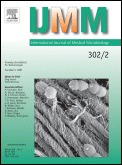
INTERNATIONAL JOURNAL OF MEDICAL MICROBIOLOGY
Scope & Guideline
Connecting Research and Practice in Infectious Diseases
Introduction
Aims and Scopes
- Microbial Pathogenesis:
Research on the mechanisms through which microorganisms cause diseases in humans, including studies on virulence factors and host-pathogen interactions. - Antimicrobial Resistance:
Investigating the emergence, mechanisms, and clinical implications of resistance among various pathogens, aiming to inform treatment strategies and public health policies. - Diagnostic Innovations:
Development and evaluation of novel diagnostic techniques, including molecular methods and next-generation sequencing, to enhance the identification and management of infectious diseases. - Epidemiology and Public Health Microbiology:
Studies that analyze the distribution and determinants of infections in populations, emphasizing public health interventions and surveillance systems. - Therapeutic Approaches and Vaccine Development:
Exploration of new treatments and vaccines targeting infectious diseases, including preclinical and clinical evaluations of efficacy and safety. - Microbiome Research:
Studies focused on the role of microbiota in health and disease, including the impact of gut microbiota on systemic health and disease outcomes.
Trending and Emerging
- Genomic Surveillance and Molecular Epidemiology:
There is a growing emphasis on genomic and molecular epidemiology to understand the spread of pathogens and their resistance patterns, particularly in response to global health crises like the COVID-19 pandemic. - Host-Pathogen Interactions and Immunology:
Research exploring the complex interactions between hosts and pathogens, including the immune response to infections, is gaining momentum, highlighting the importance of understanding immunity in infection control. - Antimicrobial Stewardship and Resistance Management:
The focus on strategies to combat antimicrobial resistance through stewardship programs and the development of new therapeutic agents is increasingly prevalent, reflecting global health priorities. - Metagenomics and Microbiome Studies:
Research utilizing metagenomic techniques to explore the human microbiome's role in health and disease is emerging as a significant area of interest, particularly in understanding complex disease mechanisms. - Innovative Vaccine Technologies:
The development of new vaccine platforms, including mRNA and vector-based vaccines, is a growing trend, especially in the context of rapid responses to infectious disease outbreaks.
Declining or Waning
- Traditional Culture-based Microbiology:
Research relying heavily on culture-based methods for pathogen identification has become less prominent, as molecular and rapid diagnostic techniques gain traction. - Historical Epidemiological Studies:
Although still relevant, studies focusing solely on historical trends in epidemiology without incorporating modern molecular techniques have decreased in frequency. - Basic Microbial Ecology:
Research that primarily explores basic ecological aspects of microbes without direct clinical relevance appears to be waning, as the journal shifts towards more applied and translational research themes. - Animal Models of Infection:
While important, the use of traditional animal models for studying infections is less emphasized compared to innovative in vitro systems and humanized models that provide more relevant data for human health.
Similar Journals
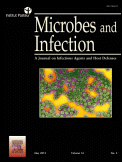
MICROBES AND INFECTION
Championing Open Access for Microbial InsightsMICROBES AND INFECTION is a premier academic journal published by Elsevier, dedicated to the dynamic fields of immunology, infectious diseases, and microbiology. With a notable impact factor reflective of its high-quality research contributions, the journal is categorized in the Q2 quartile across these fields as of 2023. Based in France and operating since 1999, MICROBES AND INFECTION offers a platform for researchers, professionals, and students to disseminate and access cutting-edge findings that drive innovation and knowledge in microbial and infectious disease research. The journal is ranked impressively within the Scopus database, securing ranks such as #16 in Microbiology and #33 in Infectious Diseases, underscoring its high relevance in the scientific community. Subscribers to the journal can expect an array of articles, reviews, and original research, all designed to advance understanding and improve clinical practices in the fight against infectious agents. With its ongoing commitment to open access options, MICROBES AND INFECTION continues to foster global collaboration and information sharing in the pursuit of addressing pressing microbiological challenges.
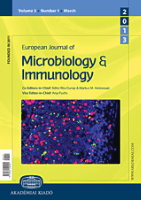
European Journal of Microbiology and Immunology
Fostering Innovation in Immunological StudiesWelcome to the European Journal of Microbiology and Immunology, a premier platform dedicated to advancing the field of microbiology and immunology through the dissemination of high-quality research. Published by AKADEMIAI KIADO ZRT in Hungary, this journal serves as an essential resource for researchers, professionals, and students alike, fostering scholarly communication and innovation in these critical areas of medical science. The journal, which holds an ISSN of 2062-8633, presents rigorously peer-reviewed articles that contribute to our understanding of microbial diseases, immune responses, and related fields, currently ranking in the Q2 and Q3 quartiles across multiple categories such as immunology and microbiology. By embracing an inclusive scholarly dialogue and offering a robust readership, the European Journal of Microbiology and Immunology aims to inspire the next wave of discoveries and collaborations within the global scientific community.

Frontiers in Cellular and Infection Microbiology
Leading the charge in microbiological excellence.Frontiers in Cellular and Infection Microbiology, published by FRONTIERS MEDIA SA, is a leading Open Access journal that has been at the forefront of microbiological research since 2011. Located in Switzerland, this journal aims to provide a platform for innovative and impactful studies in various domains including immunology, infectious diseases, and medical microbiology. With an impressive range of quartile rankings—Q1 in Infectious Diseases, Microbiology, and Microbiology (medical), and Q2 in Immunology—as of 2023, it positions itself as a highly reputable source in the academic community. Furthermore, its Scopus rankings highlight its significance within the respective fields, with top percentiles in key categories, making it an essential resource for researchers, professionals, and students alike. As an Open Access publication, it ensures that vital findings are accessible to a global audience, fostering collaboration and advancement in science.

New Microbiologica
Exploring the vital links between microorganisms and human health.New Microbiologica is a prominent academic journal published by EDIZIONI INT SRL, dedicated to advancing knowledge in the fields of Microbiology and Medicine. Since its inception in 1993, this journal has played a vital role in disseminating cutting-edge research, featuring articles that explore the intricate relationships between microorganisms and human health. With an H-index indicating a robust citation profile and a respectable 2023 Scopus Ranking placing it in the 32nd percentile for medicine microbiology, New Microbiologica resonates well within the academic community. Although not an Open Access journal, it is strategically positioned in Quartile 3 of both Medicine (miscellaneous) and Medical Microbiology categories, which reflects its importance to researchers and professionals seeking valuable insights in their fields. Published in Italy, the journal continues to provide a platform for impactful research through its commitment to high-quality publications, fostering collaboration and innovation among scientists and academics in the ever-evolving landscape of microbiological studies.
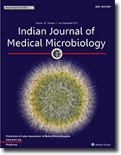
Indian Journal of Medical Microbiology
Your Gateway to Open Access Microbiological ResearchIndian Journal of Medical Microbiology, published by Elsevier, is a pivotal peer-reviewed journal dedicated to the field of medical microbiology, providing a vital platform for research and scholarship since its inception in 1986. With an Open Access model established in 2001, it ensures the dissemination of scientific knowledge to a global audience, enhancing accessibility for researchers, professionals, and students alike. The journal's scope spans critical areas including immunology, infectious diseases, and microbiology, with an impressive trajectory marked by converged years of publication allowing for a comprehensive exploration of evolving scientific trends. As of 2023, the journal holds a Q3 ranking in Infectious Diseases and Microbiology (medical) and a Q4 ranking in Immunology and Microbiology categories, reflecting its significant yet growing impact in the field. Researchers seeking to contribute to or stay updated on the latest advancements in medical microbiology will find the Indian Journal of Medical Microbiology a valuable resource, as it consistently bridges the gap between emerging science and clinical application.

Reviews and Research in Medical Microbiology
Delivering High-Impact Research for Healthcare ProfessionalsReviews and Research in Medical Microbiology is a premier academic journal published by LIPPINCOTT WILLIAMS & WILKINS, focusing on groundbreaking research and comprehensive reviews that advance the understanding of medical microbiology. With an ISSN of 2770-3150 and an E-ISSN of 2770-3169, this journal serves as an essential resource for researchers, healthcare professionals, and students dedicated to the study of pathogens, infectious diseases, and microbial mechanisms affecting health. While the journal currently does not offer open access, its rigorous peer-review process ensures that only high-quality, impactful research is disseminated to the scientific community. The journal aims to bridge gaps in knowledge by presenting cutting-edge studies that explore novel therapeutic strategies, diagnostic methods, and the evolving landscape of microbial resistance. Nestled in the heart of Philadelphia, this journal proudly contributes to the advancement of medical microbiology and is an indispensable platform for the publication of critical findings that shape clinical practices and research trajectories in the field.
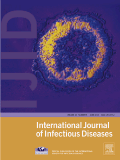
INTERNATIONAL JOURNAL OF INFECTIOUS DISEASES
Exploring breakthroughs in infectious disease management.INTERNATIONAL JOURNAL OF INFECTIOUS DISEASES, published by ELSEVIER SCI LTD, stands as a leading platform in the realm of infectious diseases, contributing significantly to the global understanding of this critical field. With an impressive impact factor, the journal maintains a distinguished Q1 ranking across various categories, including Infectious Diseases, Medicine (miscellaneous), and Medical Microbiology, demonstrating its high relevance and influence among contemporary research. Since its inception in 1996, it has embraced an Open Access model, allowing for wider dissemination of essential research findings that can inform public health policies and clinical practices. With a commitment to advancing scientific knowledge, this journal is not only a vital resource for researchers and professionals but also serves as an invaluable educational tool for students interested in the complexities of infectious diseases and their management. For those looking to stay at the forefront of research and innovation in this field, the INTERNATIONAL JOURNAL OF INFECTIOUS DISEASES is an indispensable resource.
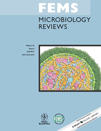
FEMS MICROBIOLOGY REVIEWS
Connecting Microbial Research to Medical InnovationsFEMS Microbiology Reviews, published by Oxford University Press, is a leading journal in the field of microbiology, with a notable impact in related disciplines such as infectious diseases and medicine. Since its inception in 1989, this esteemed journal has grown to occupy a prestigious position, consistently ranking in the first quartile (Q1) in various categories, including Infectious Diseases, Medicine (miscellaneous), and Microbiology. With an impressive Scopus ranking of #13 in Microbiology and #25 in Infectious Diseases, it is recognized for its high-quality and impactful reviews that bridge the gap between fundamental microbiological research and practical applications. Aimed at researchers, professionals, and students alike, FEMS Microbiology Reviews offers critical insights and comprehensive analyses, making it an essential resource for those engaged in the dynamic study of microbial life and its implications for health and disease.
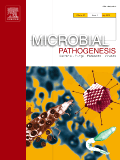
MICROBIAL PATHOGENESIS
Exploring Innovative Solutions in Infectious DiseasesMICROBIAL PATHOGENESIS, published by Academic Press Ltd - Elsevier Science Ltd, is a prominent journal in the fields of Infectious Diseases and Microbiology, with a notable impact factor and classified in the Q2 quartile for both categories as of 2023. Since its inception in 1986, this journal has provided a platform for the dissemination of cutting-edge research that enhances our understanding of microbial infections and their implications in health and disease. The journal is indexed in Scopus, ranking #80 among 344 in Infectious Diseases and #57 among 182 in Microbiology, underscoring its significant contribution to the scientific community. Although it operates under a traditional subscription model, the content is vital for researchers, professionals, and students focused on the dynamics of microbial pathogenesis and the development of innovative therapeutic strategies. The journal's comprehensive scope aims to foster advancements in this critical area of study, bridging the gap between laboratory research and clinical applications.
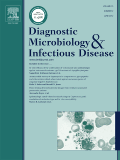
DIAGNOSTIC MICROBIOLOGY AND INFECTIOUS DISEASE
Advancing the Frontiers of Infectious Disease DiagnosticsDIAGNOSTIC MICROBIOLOGY AND INFECTIOUS DISEASE, published by Elsevier Science Inc, is a leading journal in the fields of Infectious Diseases, Microbiology, and Medicine. Since its inception in 1983, this esteemed journal has consistently provided a platform for original research and comprehensive reviews that advance the understanding of diagnostic microbiology and its implications for infectious diseases. With an impressive impact factor placing it in the Q2 category in multiple relevant fields as of 2023, it stands out with Scopus rankings reinforcing its significance in academia, ranking #136 out of 344 in Infectious Diseases and #64 out of 140 in Medical Microbiology. This journal is essential for researchers, healthcare professionals, and students who seek to stay abreast of the latest developments and trends in infectious diagnostics. DIAGNOSTIC MICROBIOLOGY AND INFECTIOUS DISEASE is committed to fostering excellence in research quality and academic rigor, ensuring accessibility to vital knowledge for addressing some of the most pressing health challenges of our time.